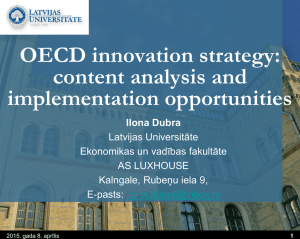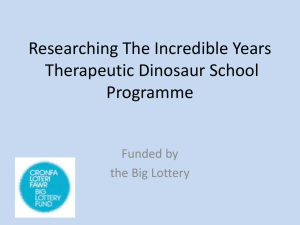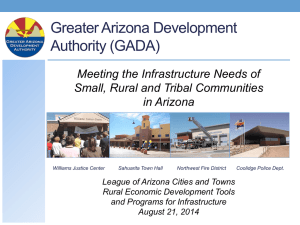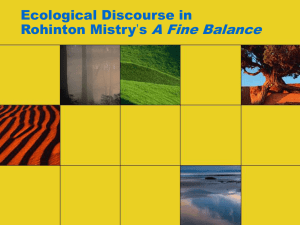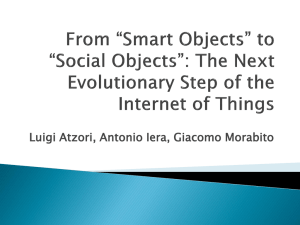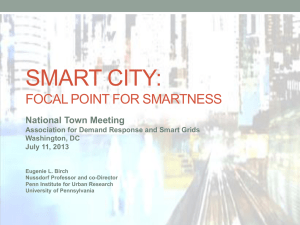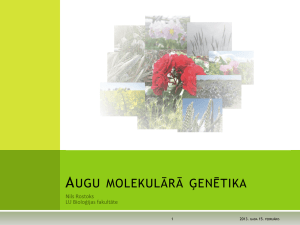MVU tematika Horizonts 2020 IKT un Ener**tikas
advertisement
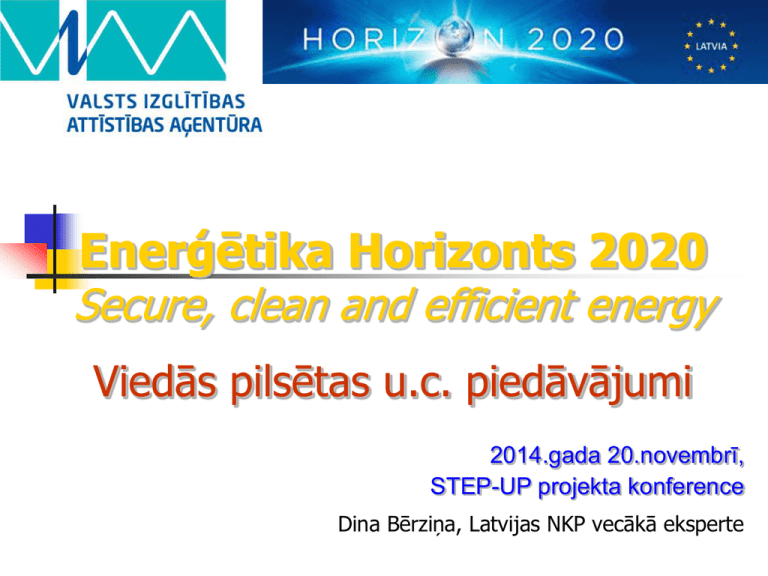
Enerģētika Horizonts 2020 Secure, clean and efficient energy Viedās pilsētas u.c. piedāvājumi 2014.gada 20.novembrī, STEP-UP projekta konference Dina Bērziņa, Latvijas NKP vecākā eksperte Programmas evolūcija Horizonts 2020 Enerģētikas programma ir divu iepriekšējo Ietvara programmu apvienojums: 7.IP “Enerģētika” un KIP “Saprātīga enerģija Eiropai” (CIP IEE) Programmas realizācija ar apakšlīgumu (framework contract) tiks nodota INEA un EASME Izpildaģentūrām (kā tas jau bija CIP IEE) Visās H2020 sadaļās tiek realizēta 2-gadu Darba programma: pašlaik 2014.-2015., tiek gatavota 2016.-2017. 2014.gada 20.novembris Dina Bērziņa, IKT & Enerģētikas NKP 2 Secure, clean and efficient energy in H2020 designed by merging: FP7 “Energy” and CIP “Intelligent Energy Europe” (CIP IEE): 2 responsible DGs: DG ENER (units C2 and C3 responsible for EE, SCC and the parts “grids” and “storage” in LCE); DG RTD (units G1, G2, G3, G4 – the rest) 2 implementing Executive Agencies: Topics EE4, EE5, EE7, EE8, EE9, EE10, EE14, EE15, EE16, EE17, EE19, EE20, EE21, LCE4, LCE14 and ‘Other Actions’ come from IEE INEA - Innovation and Network Executive Agency (ex TEN-TEA) EASME - Executive Agency for Small and Medium Enterprises (ex EACI) Two-year Work Programmes: currently 2014-2015, under preparation 2016-2017 2014.gada 20.novembris Dina Bērziņa, IKT & Enerģētikas NKP 3 Enerģētikas Projektu konkursi Energy Calls (Open) 1 2014.gada 20.novembris Dina Bērziņa, IKT & Enerģētikas NKP 4 Enerģētikas Projektu konkursi Energy Calls (Forthcoming) 2 2014.gada 20.novembris Dina Bērziņa, IKT & Enerģētikas NKP 5 Enerģētikas Projektu konkursi Energy Calls 3 • EE-06-2015: Demand response in blocks of buildings • EE-11-2015: New ICT-based solutions for energy efficiency • EE-13-2015: Technology for district heating and cooling • EE-20-2015: Project development assistance for innovative bankable and aggregated sustainable energy investment schemes and projects • LCE-03-2015: Demonstration of renewable electricity and heating/cooling technologies • LCE-04-2015: Market uptake of existing and emerging renewable electricity, heating and cooling technologies • LCE-05-2015: Innovation and technologies for the deployment of meshed off-shore grids • LCE-06-2015: Transmission grid and wholesale market • LCE-09-2015: Large scale energy storage • LCE-12-2015: Demonstrating advanced biofuel technologies • LCE-13-2015: Partnering with Brazil on advanced biofuels • LCE-14-2015: Market uptake of existing and emerging sustainable bioenergy • LCE-18-2015: Supporting Joint Actions on demonstration and validation of innovative energy solutions • LCE-19-2015: Supporting coordination of national R&D activities • LCE-21-2015: Modelling and analysing the energy system, its transformation and impacts • LCE-23-2015: Supporting the community in deploying a common framework for measuring the energy and environmental efficiency of the ICT-sector • SCC-01-2015: Smart Cities and Communities solutions integrating energy, transport, ICT sectors through lighthouse (large scale demonstration - first of the kind) projects • SCC-03-2015: Development ofDina system standards smart cities and communities solutions 6 Bērziņa, IKT & for Enerģētikas NKP 2014.gada 20.novembris Budžets / Budget Projektu konkursi Energy Efficiency Smart Cities and Communities Competitive Low-Carbon Energy Kopā: 2014 (M€) 2015 (M€) 97,5 98,15 92,32 108,18 359,1 372,33 548,92 578,66 Vēl papildus finansējums sadaļās: SMEs and Fast Track to Innovation, EurAtom Fission 2014.gada 20.novembris Dina Bērziņa, IKT & Enerģētikas NKP 7 Enerģētika/ Energy in H2020 1 2014.gada 12.marts Dina Bērziņa, IKT & Enerģētikas NKP, SZA 8 Enerģētika/ Energy in H2020 2 Meklēšana pēc temata / Search by: Energy (ec.europa.eu/research/participants/portal/desktop/ en/opportunities/h2020/search/search_topics.html): 31 results for Open Calls; 51 results for Forthcoming Calls Energy Efficiency – 15 / 23 results Smart Cities – 4 / 8 results Innovation and territorial cooperation – 0 SEAP actions - 0 2014.gada 20.novembris Dina Bērziņa, IKT & Enerģētikas NKP 9 Saistoši temati / Some Topics 1 EE 6-2015– Demand response in blocks of buildings EE 13-2015 – Technology for district heating and cooling heating/cooling technologies (inovāciju projekti - 70%); LCE 18-2015 – Supporting Joint Actions on demonstration and validation of innovative energy solutions (pētniecības projekti - 100%); LCE 3-2015 – Demonstration of renewable electricity and (inovāciju projekti - 70%); (ERA-NET Cofund- 33%); LCE 23-2015 – Supporting the community in deploying a common framework for measuring the energy and environmental efficiency of the ICT-sector Dina Bērziņa,-IKT & Enerģētikas NKP 2014.gada 20.novembris (koordinācijas/atbalsta darbības 100%); 10 Saistoši temati / Some Topics 2 SCC 1-2015 – Smart Cities and Communities solutions integrating energy, transport, ICT sectors through lighthouse (large demo) projects ~ lieli Viedo pilsētu demonstrācijas projekti, kuros integrētas enerģētikas, transporta, informācijas un komunikācijas tehnoloģiju nozares (inovāciju projekti - 70%); obligāti skatīt 2014.gadā finansētos projektus SCC 3-2015 – Development of system standards for smart cities and communities solutions (koordinācijas/atbalsta darbības - 100%) 2014.gada 20.novembris Dina Bērziņa, IKT & Enerģētikas NKP 11 Viedas pilsētas jēdziens Viedai pilsētai ir dažādas definīcijas: šaurāka: IT rīku izmantošana pilsētpārvaldē, plašāka: ekonomiska resursu izmantošana visās nozarēs, t.sk. energoefektivitāte, integrēta: ieguldījumi cilvēkkapitālā un infrastruktūrā, lai celtu dzīves līmeni un iesaistītu iedzīvotājus pārvaldē, alternatīva: attīstīt pilsētai pieguļošās teritorijas, lai iedzīvotāji masveidā nepārceltos uz attīstītajām pilsētām 2014.gada 20.novembris Dina Bērziņa, IKT & Enerģētikas NKP 12 Concept of Smart City Several approaches could be found: narrow view: cities which use ICT to deliver services to their citizens; broader view: cities which efficiently use resources across all sectors resulting in cost and energy savings, improved service and quality of life, and supporting innovation, smart technologies and the low-carbon economy leading to CO2 neutrality; integrated approach: investments in human and social capital along with transport and modern ICT infrastructure secure sustainable economic development and high quality of life, with a wise management of natural resources through participatory governance; alternative approach: substantial attention is devoted to the role of social capital in urban development – smart city’s community has learned to learn, adapt and innovate thereby shifting towards knowledge-based economy. 2014.gada 20.novembris Dina Bērziņa, IKT & Enerģētikas NKP 13 Viedas pilsētas Horizontā 2020 SCC 1 – 2015 apskata 3 integrāli saistītas un neatdalāmas jomas zemas oglekļa emisijas pilsētu (tās rajonu) veidošanā: plaši paraugprojektu (light house) demonstrējumi, kad esošās tehnoloģijas vai to izstrādes pēdējā stadijā (close to the market) tiek integrētas novatoriskā veidā: (nulles) vai zema enerģijas patēriņa rajoni: vietējo enerģijas resursu izmantošana, aktīva patērētāju iesaistīšana; rentabla esošo dzīvojamo ēku renovācija ar ilgtspējīgiem materiāliem; IKT risinājumu pielietošana pilsētplānošanā, enerģētikas pārvaldībā un transporta sistēmas uzlabošanā, integrēta infrastruktūra: esošo infrastruktūras daļu fiziska integrācija - ielu apgaismojums, rūpnieciskas teritorijas; sinerģija starp elektropārvades viedtīkliem, platjoslas infrastruktūru, centralizētu siltumapgādi un/vai dzesēšanu, ilgtspējīga transporta sistēma (mobilitāte): ar alternatīvo degvielu darbināmu transporta līdzekļu uzpildes infrastruktūra - ietekme uz elektroenerģijas tīklu liela elektromobiļu skaita gadījumā, nodrošinājums ar alternatīvās degvielas maisījuma uzpildi, ... 2014.gada 20.novembris Dina Bērziņa, IKT & Enerģētikas NKP 14 Viedas pilsētas Horizontā 2020 SCC 1 –2015 Smart Cities and Communities solutions integrating energy, transport, ICT sectors through lighthouse (large scale demonstration) projects: (Nearly zero) or low energy districts: energy supply by predominant local resources; cost-effective refurbishment of existing buildings; cross-cutting ICT solutions for the design and overall management of energy/ transport systems; Integrated Infrastructures: integration of physical infrastructures (core networks, street scenes, lighting, industrial sites, etc.) for re-use and repurposing – leading to quantifiable benefits; exploitation of synergies between requirements for smart grids, broadband infrastructures and in general poly networks (e.g. district heating and cooling); Sustainable urban mobility: integration of energy/ fuelling infrastructure with vehicle fleets powered by alternative energy carriers for public and private transport, including logistics and freight-distribution - implications on energy management; e.g.: electromobility - the impact on the electricity grid, of the deployment of high numbers of vehicles and/or the alternative fuel blends... 2014.gada 20.novembris Dina Bērziņa, IKT & Enerģētikas NKP 15 Viedas pilsētas Horizontā 2020 some additional info... for Innovation actions: Excellence - Extent that proposed work is ambitious, has innovation potential, and is beyond the state of the art; Impact - Strengthening the competitiveness and growth of companies by developing innovations meeting the needs of European and global markets, and where relevant, by delivering such innovations to the markets; to determine the ranking, the score for the criterion ‘impact’ will be given a weight of 1.5; Implementation - the operational capacity of applicants to carry out the proposed work based on (CV, relevant publications or achievements, relevant previous projects or activities, description of any significant infrastructure or any major items of technical equipment) 2014.gada 20.novembris Dina Bērziņa, IKT & Enerģētikas NKP 16 Viedas pilsētas – Eiropas Inovācijas partnerība European Innovation Partnership (EIP-SCC) : ec.europa.eu/eip/smartcities (2012.g.). Kopīgi sadarbojas pilsētas, rūpniecības uzņēmumi un iedzīvotāji, lai ar ilgtspējīgiem risinājumiem uzlabotu pilsētu dzīvi. Galvenie darbības lauki: inovāciju ieviešana, kompleksa plānošana, plašāka iedzīvotāju līdzdalība, energoefektivitāte, sakārtota transporta sistēma, prasmīgi IKT pielietojumi 2014.gada 20.novembris Dina Bērziņa, IKT & Enerģētikas NKP 17 European Innovation Partnership on Smart Cities and Communities (EIP-SCC, ec.europa.eu/eip/smartcities) brings together cities, industry and citizens to improve urban life through more sustainable integrated solutions: applied innovation, better planning, more participatory approach, higher energy efficiency, better transport solutions, intelligent use of Information and Communication Technologies (ICT) 2014.gada 20.novembris Dina Bērziņa, IKT & Enerģētikas NKP 18 Market Place of the European Innovation Partnership on Smart Cities and Communities (http://eu-smartcities.eu/priority-areas) Priority areas are defined in the Strategic Implementation Plan of the European Innovation Partnership on Smart Cities and Communities: Sustainable Urban Mobility Sustainable Districts and Built Environment Integrated Infrastructures and processes across Energy, ICT and Transport Citizen focus Policy and Regulation Integrated Planning & management Knowledge Sharing Baselines, Performance Indicators and Metrics Open data governance Standards Business Models, Procurement and Funding 2014.gada 20.novembris Dina Bērziņa, IKT & Enerģētikas NKP 19 NKP eksperti Jūsu rīcībā 24/7! www.h2020.lv (under construction) Dina Bērziņa, dinab@latnet.lv un dina.berzina@viaa.gov.lv 2014.gada 20.novembris Dina Bērziņa, IKT & Enerģētikas NKP
